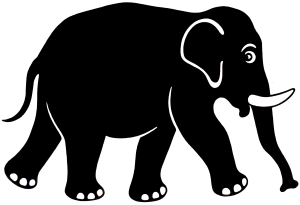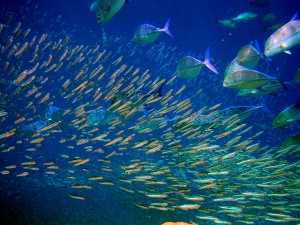Black Elephants: Ignorance, Extinction and Human Impact on the Planet
Nov 26th, 2014 | By admin | Category: Biodiversity/ConservationBy Suzanne York, www.howmany.org
It is said that ignorance is bliss. What about willful ignorance, or worse, indifference?
It is undeniable that humans are changing the environment and affecting the planet’s biodiversity, and much of this change is not for the better. But it is easier to stick our heads in the sand, look the other way, and/or blame someone else for humanity’s detrimental impacts.
The Gathering of Black Elephants
A recent column by Thomas Friedman of the New York Times (“Stampeding Black Elephants”) discusses our “predicament” with other species. He was writing about the World Parks Congress, which is held about once a decade to discuss the world’s protected areas (though given that the world is in the midst of the sixth mass extinction or on the verge of it, perhaps it should be held more often).Friedman noted the use of the term “black elephant,” which is a cross between “a black swan” (an unlikely, unexpected event with enormous ramifications) and the “elephant in the room” (a problem that is visible to everyone, yet no one still wants to address it) even though we know that one day it will have vast, black-swan-like consequences.
He was quoting investor and environmentalist Adam Sweidan, who said, “there are a herd of environmental black elephants gathering out there” — global warming, deforestation, ocean acidification, mass extinction and massive fresh water pollution. “When they hit, we’ll claim they were black swans no one could have predicted, but, in fact, they are black elephants, very visible right now.”
Interestingly enough, Friedman ignores the big elephant in the room, that of human population growth and our insatiable appetite for land and resources. A quick glance at the news shows how visible that is today. From the Keystone XL pipeline to deforestation of the Amazon to coal ports of the Great Barrier Reef, humans are changing the face of the planet.
In the past three years, ivory-seeking poachers have killed 100,000 African elephants, mostly to meet demand for it in Asia. Earlier this month, some Chinese officials were accused of smuggling ivory using diplomatic bags as they left Tanzania.
Just last week, the New York Times ran an article about oil drilling in Virunga National Park in the Democratic Republic of the Congo (DRC), home to the endangered mountain gorillas. The DRC is the fourth most populous country in Africa, with 74 million people. How can animals expect to survive when there is constant human encroachment on wild lands? Too many protected areas around the world are struggling with poaching and resource extraction. Yet human consumption continues to rise, unabated.
It’s not just elephants. An international team of ecologists and economists predicted in the journal Science the extinction of salt-water fish by 2048 due to overfishing, pollution, habitat loss, and climate change. It’s another black elephant – we know that the oceans are being overfished and are nearing collapse. In fact, 29 percent of edible fish and seafood species have declined by 90 percent.
But who wants to really hear this, when Black Friday and holiday meals are coming up?
Can We Change Human Behavior and Save Species?
Certainly, more land and water systems need to be conserved and protected. People need to be educated and cultural preferences addressed, especially on the true cost of ivory, in the case of elephants, but ultimately on unsustainable consumption and behaviors on a finite planet.
Yet Freidman, along with ignoring population growth, is ignoring the idea of perpetual economic growth, the other elephant in the room. He’s not alone. Until our society realizes that continued economic growth based on continued use of natural resources essentially equals the end of nature as we currently know it, we can talk about black elephants until we are blue in the face.
We can blithely ignore these issues until the elephants are extinct and the ocean collapse under limitless human demand, or we can change our ways. The choice is ours to make.
Suzanne York is a senior writer with the Institute for Population Studies.


